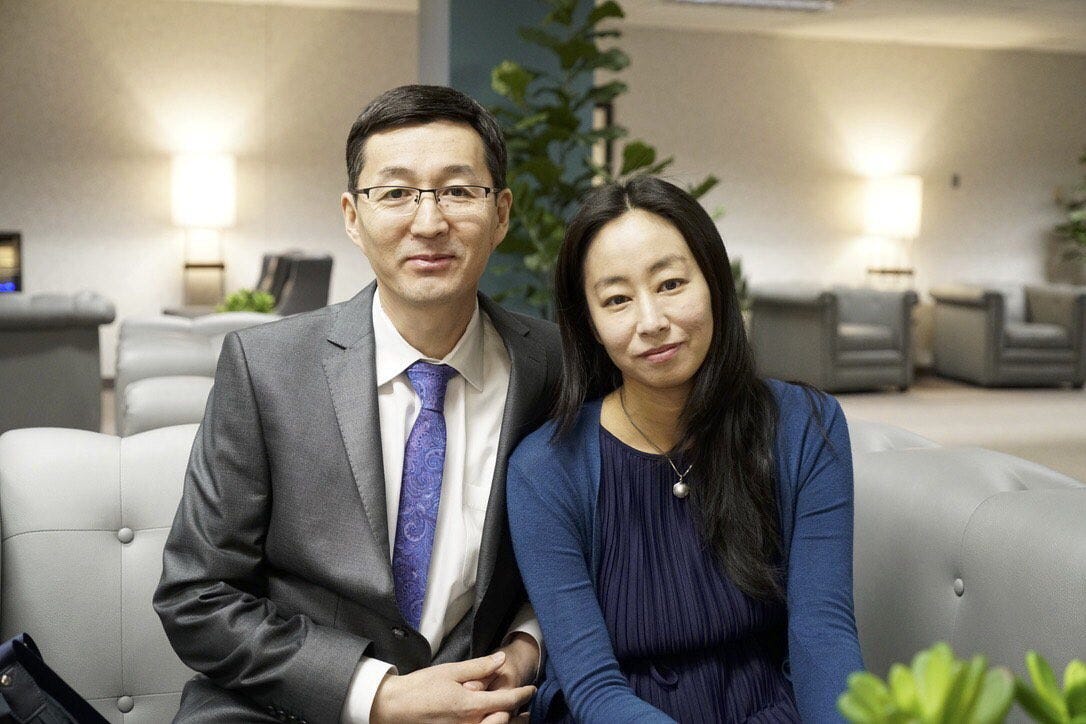Kyrgyzstan's Jehovah's Witnesses Fear Russia's Extremism Law
Hello and welcome to the first LAZO LETTERS of 2022. Thank you so much for being here. I know everyone is thinking about Kazakhstan these days, but today we're going to turn our attention to another country in Central Asia.
If you enjoy this newsletter, please share it with a friend, share a link on social media, or upgrade to a premium subscription for $2 a month if you can afford it. And please feel free to send story tips or recommendations to: c.maza@protonmail.com.
Upgrade to a premium subscription by Clicking Here.
In 2017, Russia outlawed the Jehovah's Witnesses, a Christian denomination founded in the United States in 1872, and branded them as extremists. There are estimated to be almost 200,000 practicing Jehovah's Witnesses in Russia, but some have started to flee due to persecution over the past five years.
People suspected of practicing the religion have been subjected to violent raids and arrests, had their property seized, and even gotten lengthy jail sentences.
Now, Jehovah's Witnesses in nearby Kyrgyzstan are worried that the country's leadership could follow in Russia's footsteps. In December, the Pervomayskiy District Court in Bishkek rejected a prosecutor's application to ban the Jehovah's Witnesses' religious texts as extremist literature. The ruling was a win for the religious group, which has around 5,000 adherents in Kyrgyzstan.
Still, it was a little too close for comfort. Kyrgyzstan has attempted to import repressive laws from Russia before.
“What’s happening in Kyrgyzstan is the latest consequence of Russia’s ambitious foreign-policy strategy to export its systematic persecution of Jehovah’s Witnesses under the pretense of fighting extremism,” said Jarrod Lopes, spokesman for Jehovah’s Witnesses. “Kyrgyzstan is simply following Russia’s model of repression— ban the Witnesses’ literature with the ultimate goal of banning their organization."
For this week's interview, I spoke to Balut Dhakiev, a practicing Jehovah's Witness from the village of Terek-Say in Kyrgyzstan's Jalalabad region.
Cristina: What religion did your family practice when you were growing up?
Balut: I grew up in the Soviet Union, so as you know, people were atheists at the time. But my parents were nominal Muslims. I am 48 years old now, and I was around 18 years old when the Soviet Union collapsed.
Cristina: When did you become a practicing Jehovah's Witness?
Balut: I was raised in a village, and after school, I came to Bishkek for university. I was a student here and learned about Jehovah's Witnesses. I was 21 years old at the time.
It was amazing and eye-opening. I had been seeking the truth since childhood. I had one main question for everyone. I asked my mom, my friends: Why do people die? No one could answer.
When I met the Witnesses here, they were two young girls. They showed me in the Bible that we can live forever because that's how we were created. God's original purpose was for us to live forever. It was a very happy day for me. I thought, me and my family, we can live forever.
I started studying and then was convinced that this was the truth, that the truth is in the Bible.
Cristina: What was your family's reaction when you told them you were becoming a Jehovah's Witness?
Balut: Immediately after discovering the Bible, I went home for the holidays. I began to preach and tell all of my relatives, my parents. They were all happy. They wanted to learn more. Some also started studying with me. People in my village were also interested.
But when I left, the religious leaders in my village opposed this. They scared people into stopping their studies.
Cristina: Are Muslim leaders very influential in your village?
Balut: Yes, especially after the fall of the Soviet Union. They became influential.
Cristina: Are most of Kyrgyzstan's Jehovah's Witnesses based in Bishkek? And are you experiencing any intimidation there?
Balut: There are many witnesses here in Bishkek. Some are Russians. Some are Kyrgyz.
In general, Jehovah's Witnesses appreciate our freedom in this country. Kyrgyzstan is considered the most democratic country in Central Asia. Our President recently said that all religions are equal and should have the same rights.
But recently, we have been facing some persecution. We were shocked to learn that a criminal case has been opened against our religious center since 2019. We didn't know anything about it. We have no idea why they opened it.
The State Committee for National Security, the successor of the KGB, visited our center and conducted a search last March.
Cristina: What were they searching for?
Balut: They were interested in our literature. They stayed a whole day and took documents from our office.
Everything was returned in a week due to the outreach of the international community.
We are really worried that Russia's laws will be copied here.
We are open to dialogue with the government to resolve any issues. Jehovah's Witnesses are not politically inclined. We're not involved in politics. We remain neutral.
We hope that Kyrgyzstan will not follow the example of Russia but will follow the other 240 democratic countries that recognize Jehovah's Witnesses as law-abiding and peaceful citizens.
What I'm writing:
• I dig into the protests in Kazakhstan and the structural problems that caused them. Hint: It's not about Russia, the West, or Islam.
• Russian President Vladimir Putin and his propagandists are ringing the alarm bells over NATO encroachment and demanding the organization abandon Eastern Europe. Here I look at how many NATO troops are in the region and whether they really threaten Russia. (This piece is unlocked and free to read).
• Iraqi diversity-visa winners are suing Secretary of State Antony Blinken, arguing that the State Department’s policies have prevented them from obtaining the visas they won. (This piece is unlocked and free to read).
What I'm reading:
• Kazakh President Kassym-Jomart Tokayev declared a two-week state of emergency in parts of the country after protests over rising fuel prices turned violent, the BBC reports.
• Kazakhstan’s government resigned amid the unrest. In a decree, President Tokayev said he accepted the government’s resignation and appointed the deputy prime minister, Alikhan Smailov, as the new prime minister on an interim basis, the Guardian reports.
• Tokayev ordered security forces to “fire without warning” and “open fire with lethal force,” amid a violent crackdown on anti-government protests, the Guardian reports.
• Tokayev shut off the Internet to keep protesters from communicating with each other, Bitcoin's global computing power dropped sharply, Reuters reports.
• There are growing divergences among the Visegrad Group of Poland, Hungary, Slovakia, and the Czech Republic, splitting the foursome into two sides: one that likes liberal democracy and one that doesn't, Politico Europe reports.
• The United States Treasury Department imposed sanctions on Bosnian Serb leader Milorad Dodik, accusing him of destabilizing Bosnia and Herzegovina. The Treasury Department also sanctioned Dodik-affiliated media platform Alternativna Televizija. Read our past interview about Dodik's efforts to destabilize Bosnia.
• A Russian businessman who appeared in a U.S. court on securities fraud charges could provide valuable information about Russian interference in the 2016 election and other intelligence operations, CNN reports. Vladislav Klyushin’s alleged relationship with an ex-Russian GRU military intelligence officer will likely interest U.S. law enforcement and intelligence officials.
• Regional political parties are springing up across rural Spain and banding together under the platform “Emptied Spain” to pressure the big-city elites to address the challenges facing rural inhabitants, World Politics Review reports. The coalition doesn't identify as left or right-wing.
• The European Union's High Representative for foreign affairs, Josep Borrel, visited Ukraine's Eastern front and met with Ukrainian leaders in Kyiv ahead of meetings next week between the U.S. and Russian officials. Borrel told the Polish media that the EU would act decisively if Russia committed further aggression against Ukraine.
• Hundreds of Ukrainians held a torchlit march in Kyiv to mark the birthday of the controversial nationalist leader Stepan Bandera, Radio Free Europe reports. Some consider Bandera – killed by a Soviet assassin in Germany in 1959 – a traitor for collaborating with Nazi Germany during his fight against the Soviets.
• Ukraine’s culture minister Oleksandr Tkachenko complained to Netflix over its offensive stereotypical image of a Ukrainian character in its show Emily in Paris, the Guardian reports.
• Turkey is inviting journalists to document raids on migrants and the construction of border security in an attempt to show the EU that it's protecting the bloc from migration, Politico Europe reports.
• Hackers targeted the Jerusalem Post and replaced its homepage with an image of a missile coming from a fist bearing a ring associated with General Qassem Soleimani, the Iranian general killed by a U.S. drone strike in Iraq two years ago, the Associated Press reports.
• On the two-year anniversary of Soleimani's death, Iranian President Ebrahim Raisi called for former President Donald Trump and former Secretary of State Mike Pompeo to face trial for his assassination, Reuters reports.
• Cambodia's Prime Minister Hun Sen visited Myanmar despite criticism that his trip risks legitimizing the country’s coup leaders, Al Jazeera reports.
• In today's edition of Elon Musk is the worst: Tesla opened a new showroom in the capital of Xinjiang, a region at the heart of a years-long campaign by Chinese authorities to repress and assimilate the Uyghur people, the Guardian reports. Here's my recent piece on the Uyghur Forced Labor bill that aims to ban goods from China’s Xinjiang region from entering the U.S.
• Current Haitian Prime Minister Ariel Henry was the target of an unsuccessful assassination attempt by gunmen, Reuters reports.
• Thousands of people from Ethiopia's Tigray are being deported from Saudi Arabia and held in secret detention sites in Ethiopia, according to a new Human Rights Watch report.
• Sudan’s Prime Minister Abdalla Hamdok resigned after thousands marched in Sudan’s capital Khartoum against a recent deal he made to share power with the military leaders who staged a coup in October, the BBC reports.
• Hamdok's resignation “sets up a potentially explosive confrontation between the military, a powerful paramilitary group called the Rapid Support Forces (RSF), and the protest movement,” the Washington Post reports.
What the State Department says:
Upgrade to a premium subscription by Clicking Here.
You can also contact me for any reason by writing to c.maza@protonmail.com.











